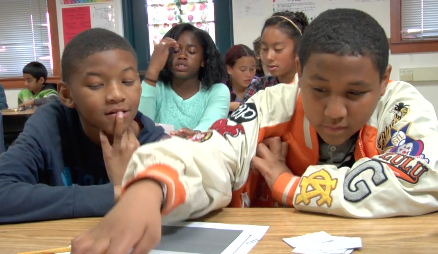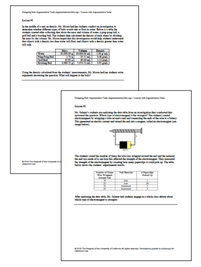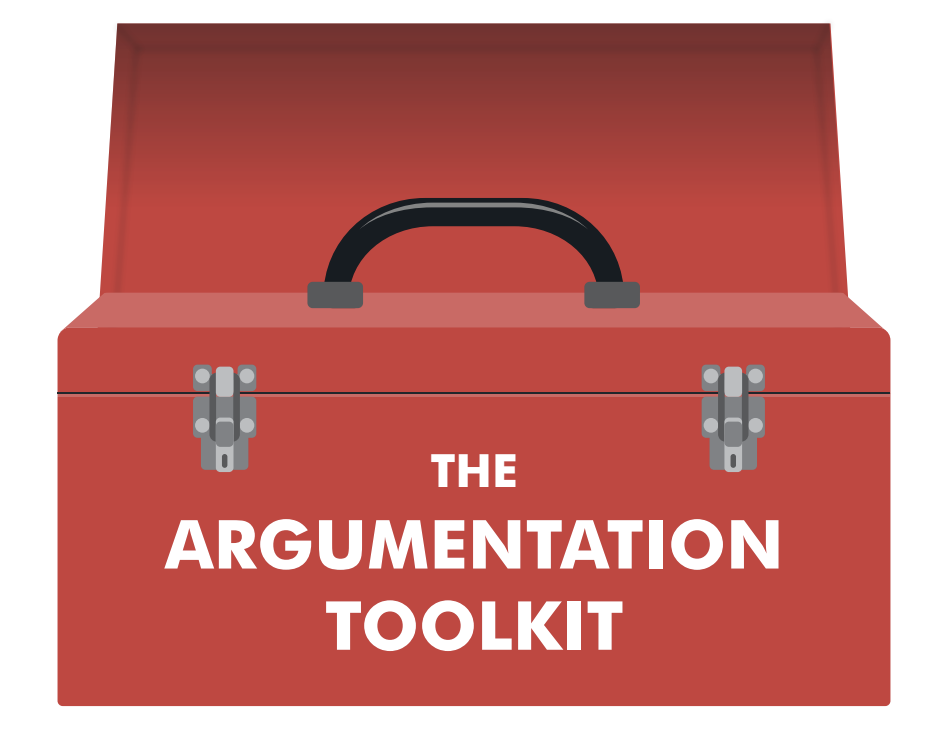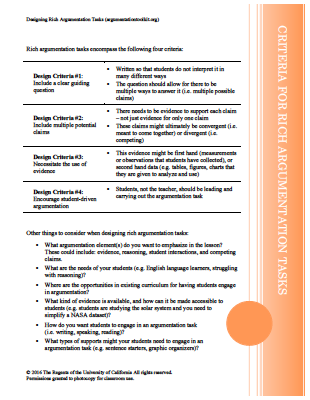What design criteria support rich argumentation tasks?
Advanced – Designing Rich Tasks Session 1
Session Goal

- Teachers will be introduced to key criteria and other things to consider when designing rich argumentation tasks.
- Teachers will consider how various instructional activities (e.g. Evidence Gradient Tool, Anticipation Guide) align with the key criteria for rich argumentation tasks.
- Teachers will design a new lesson or revise an existing lesson to integrate a rich argumentation task into their science instruction.
- Teachers will identify areas of argumentation that are challenging for their students.*
*Note: This final goal is only applicable if the module is held as multiple sessions
Session Slides:
Advanced Designing Rich Tasks Session 1 PDF
Agenda:
- Video & Discussion: Designing argumentation tasks
- Presentation: Criteria for rich argumentation tasks
- Activity: Analysis of argumentation task
- Activity: Redesign of argumentation task
*Extension – Analyze an argumentation task within a lesson!
1. Video & Discussion: Designing argumentation tasks
Watch the video below of 7th grade students involved in a partner discussion.
Students used a metabolism simulation to gather data and were considering which of the following two claims was better supported by their evidence:Abdi’s claim – Eating a lot of food before you exercise will give you more energy than eating small amounts of food during exerciseDesiree’s claim – Eating small amounts of food more frequently during exercise will give you more energy than eating a lot of food before you exercise
Discussion Questions:
- (If participants completed the Introductory Module) During the Introductory Module we covered four elements of argumentation that students may require extra support with. Which of these elements did you see in the video? Where did you see them?
- What criteria do you think the teacher had in mind when designing this rich argumentation task?
- What different criteria do you consider when designing tasks that engage students in argumentation?
2. Presentation: Criteria for rich argumentation tasks
Key criteria:
- Include a clear guiding question
- Include multiple potential claims
- Necessitate the use of evidence
- Encourage student-driven argumentation
Other things to consider:
- What argumentation elements do you want to emphasize in the lesson?
- What are the needs of your students?
- What are the opportunities in existing curriculum for having students engage in argumentation?
- What kind of evidence is available, and how can you make it accessible to students?
- How do you want students to engage in an argumentation task?
- What types of supports might your students need?
See how the four design criteria unfolded in the video just watched
3. Activity: Analysis of argumentation task

The task:
- You will now have an opportunity to evaluate two lessons that include argumentation tasks.
- As you read each lesson, keep in mind the design criteria for rich argumentation tasks.
Think-pair-share:
- Analyze the two lessons with respect to the four design criteria previously discussed.
4. Activity: Redesign of argumentation task
The task:
- Either individually, or in pairs, redesign the argumentation task in Lesson #1 or Lesson #2 from the previous activity in terms of one of the key design criteria.
- This redesign might include restructuring the task completely and/or changing the data that students are using.
Share out:
- Who would like to share their revisions? Make sure to articulate how these revisions attend to the criteria you selected.
View an example redesign.
*Extension – Analyze an argumentation task within a lesson!
The task:
- Pick a lesson from existing curriculum that includes an argumentation task and analyze it with respect to the four key criteria previously discussed (similar to how you did during the Lesson Redesign Activity).
- You might find it helpful to use the Criteria for Rich Argumentation Tasks handout.
- For the next meeting, bring the lesson you analyzed, along with notes of this evaluation.
View Other Sessions
Advanced Designing Rich Tasks Agenda
| Session Name | Description | Length |
|---|---|---|
| Session #1: What design criteria support rich argumentation tasks? | This session introduces four criteria and other considerations when designing rich argumentation tasks. | 45 minutes |
| Session #2: How can you support students to evaluate the quality of evidence? | This session incorporates an Evidence Gradient Tool as a means to support students in evaluating the quality of evidence. | 45 minutes |
| Session #3: How can you support students to revise their thinking given new evidence? | This session uses an Anticipation Guide to explore ways to support students in revising their thinking given new evidence. | 45 minutes |
| Session #4: Work session – designing a rich argumentation task | This session provides teachers with work time to develop or revise a lesson that includes a rich argumentation task. | 45 minutes |


